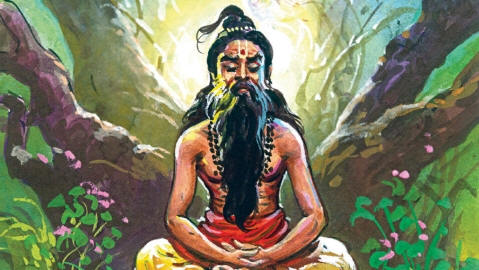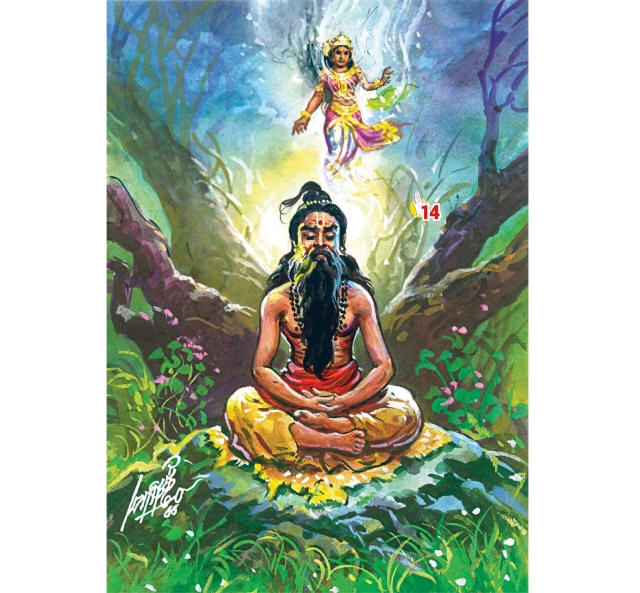The Great Sayings of Vedas
Published:07 Oct 2019 8 PMUpdated:07 Oct 2019 8 PM Sakthi Vikatan
Author: சேஷாத்ரிநாத சாஸ்திரிகள் Śēṣādrinātha Śāstrigaḷ
Images: MARUTHI
ஆதியும் அந்தமும் - 14 - மறை சொல்லும் மகிமைகள்
Andham & Ādhi – 14 – The Great Sayings of Vedas

2. A plethora of details of Parampara and life and times of Ṛṣis is available in Vedas, Purāṇas, and Itihāsas. Why is there a compulsion to talk about the Ṛṣis? It is so because of the importance of making their teachings and sage advice available to humanity.
3. It is just not enough for men to make their lives useful for themselves but should live to improve the lives of the progeny and the countrymen. Let me give you an example.
4. Purāṇas talk about Kapila Ṛṣi. After he completed the tasks for which he took birth on the earth, he went to the underworld for rest. He designed a strategy there to prevent others from touching him: If anyone dared to touch him, the toucher would reduce to ash upon the opening of his eyes.
5. On the earth, his contemporary Sagara Maharaja performed Aśvamēdha Yāgam. It was customary for the king to fulfill his needs by completing the ceremony. Such great importance, the horse sacrifice earned in those times. Bhagavan Krishna emphasized the Yāga’s importance in his spiritual Gita instructions.
6. (BG 3:10) In ancient days, the Lord of creatures created men along with sacrifice and said, "By this shall ye bring forth and this shall be unto you that which will yield the milk of your desires.'' -Dr. Radhakrishnan. Bhagavan created this universe, water, a multitude of life forms, human beings, and sacrifice, and advised humanity to attain self-sufficiency through the sacrifice.’
7. Performing Yāga brings rain. With the rain, the floras grow luxuriously. With the rise in yield, men get an abundant supply of food. With food, the Citta (intellectual pursuits and thoughts) flourishes. With Citta, there appear improved ways of life, and we live a life full of meaning and purpose. We enjoy the satisfaction of our needs.
. 8. Before the king performs the sacrifice, he should let loose in a north-easterly direction a horse to wanders at will for a year. If a king captures the stallion, the king should go to war and conquer the offending king. Once the horse comes back from its wanderings, the king should hold the Yāgam. Only the king of kings can hold the Yāgam.
9. The horse let loose by the Sagara Maharaja disappeared. The sons of Sagara Maharaja went looking for the horse in all places on the earth to no avail. Upon a person’s advice, they went to the underworld. The sons, 6000 in number, found the horse in a cave tied down to a post.
10. The cave they found and mistook as belonging to Kapila Muni. Indra tied it down in the cave. Indra was afraid that his position as the chief of the gods would be on shaky grounds if Sagara Raja’s Yāgam came to a successful conclusion. The sons of Sagara mistook that Kapila Muni took the horse.
11. Therefore, they tapped on the shoulder and woke up Kapila Muni from sleep. The moment, the Muni opened his eyes, the sons of King Sagara exploded into flames and became a heap of ash. If they were to attain a good afterlife, Tarppaṇam (= தர்ப்பணம் = libations with the waters of Ganges) with the Ganges water is the way to go. The members of the Royal household and progeny tried to perform the libations to no avail. Bhakīrathaṉ came in the royal lineage. He took a vow that his ancestors should attain redemption and a good afterlife and to that end, performed Tapas (austerity) to bring the celestial Ganges down to earth.
12. Gangādevi moved by Bhakīrathaṉ’s Tapas said to him, “Your Tapas moved me. I will descend from the celestial realm to the earth. You must make arrangements to bear the brunt of my fierce descent.”
13. Pleased with the conviction and determination of Bhakīrathaṉ, Mahēśvara told him he would bear the brunt of the fierce fall of celestial Ganges with his matted locks of russet hair on his head. The Akās Ganges, hearing Śiva’s words of assurance to Bhakīrathaṉ, came down fiercely thinking of avoiding the obstacle of the matted hair of Śiva. Śiva to tame the Ahaṅkāra (ego) of Gaṅgādevi, confined the celestial river within his matted locks.
14. Bhakīrathaṉ meditated on Śivaperumāṉ, ‘Perumāṉ, I supplicated to Gaṅgādevi to descend, but you subdued her in the coils of your matted locks.” He began his Tapas again. Śivaperumāṉ (known here as Gaṅgādhara = supporter of Ganges), taking pity on him, Śiva let Ganges River trickle down from his matted locks.
15. The trickle swelled into torrents on its way to the earth and washed away Jāhṉu Mahaṛṣi’s Yāgasālai.
16. Jāhṉu Mahaṛṣi became angry thinking that the Ganges River destroyed his Yāgasālai intended for the welfare of the world. Thinking of putting an end to Gaṅga’s flow, he drank the waters of Ganges.
17. Seeing this, Bhakīrathaṉ was unhappy that his efforts to guarantee the redemption of his ancestors went to no avail because Jāhṉu Mahaṛṣi drank the liberating Ganges River on its way to the Netherworld. The Ganges waters did not reach the underworld and so could not purify the ashes of Sagara sons.

18. Bhakīrathaṉ approached Jāhṉu Mahaṛiṣi, presented to him his intention and supplicated to him to release the Ganges River. Because of the noble intent of Bhakīrathaṉ, the Ṛṣi let a trickle of the Ganges River flow through his ear.
19. Bhakīrathaṉ invited the river to the underworld where his ancestors were a heap of ash, performed the water ceremony, and helped them attain a good afterlife. The ashes in the underworld looked like an island, which received the eponymous name, Ash Island.
20. This story has a multitude of meanings and sentiments: One Ṛṣi’s story with a multiplicity of events and narratives.
21. Water can go down to the Netherworld. It is not under the earth. If water has to find its way below the earth's surface, it has to come from the sky. Since Bhakīrathaṉ brought the Ganges from the sky, its eponymous name is Uthakam ( உதகம் = water). That waters from the sky go underground and form the aquifers. It is pure water, sustaining all living things: This is a gift from the sky, a storied Tattva for realization.
22. This water from the skies falls as rain, runs as rivers, reaches the ocean, becomes water vapor and clouds and showers again on the earth. This is a cyclical event. Ṛṣis brought these facts to our attention, a principle as said in the puranic Kapila Ṛṣi’s story.
23. There is another principle in the story of Kapila.